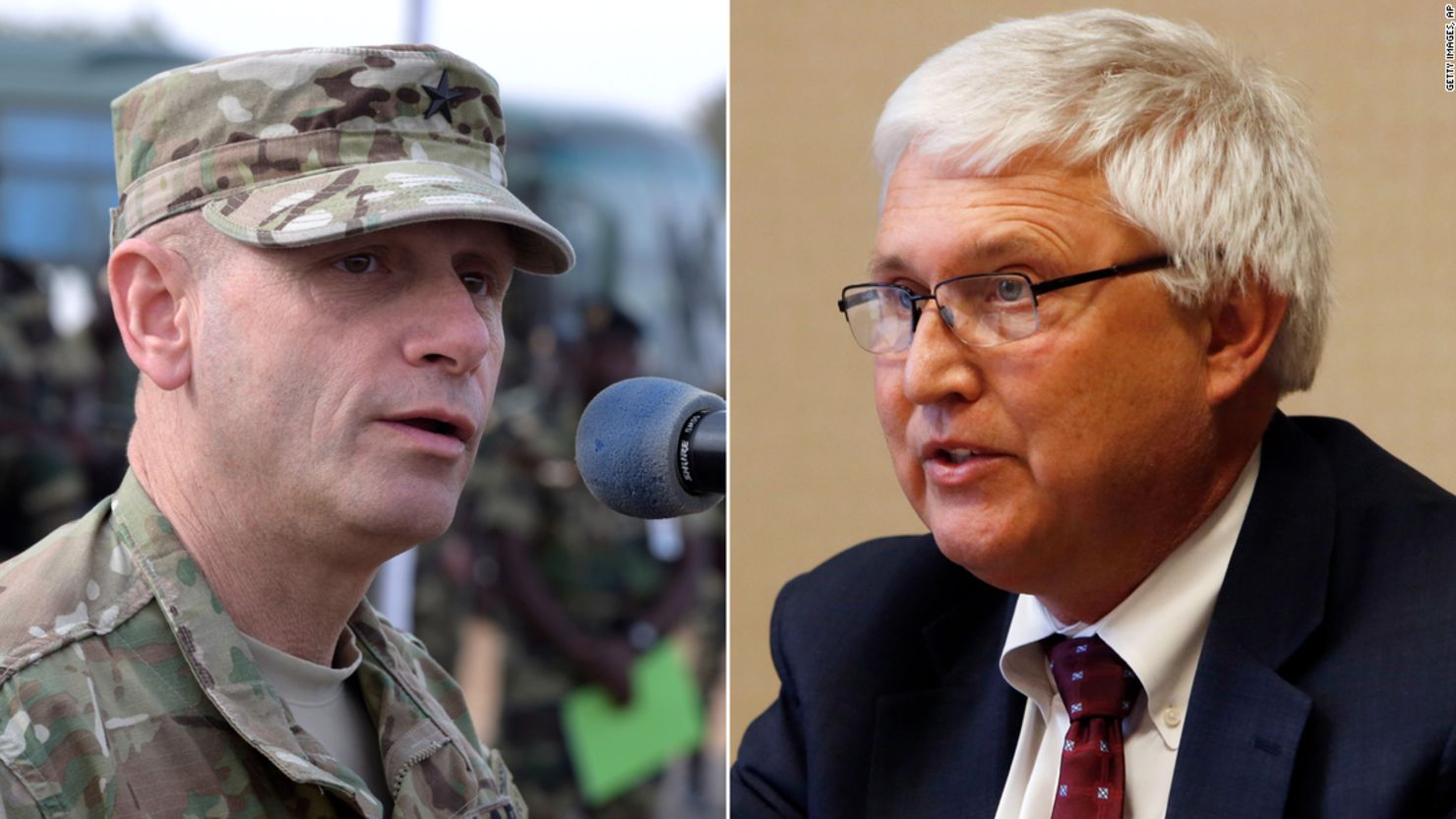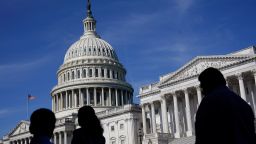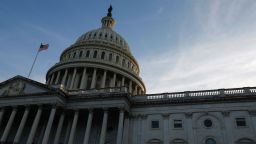Republicans are pouring money into next week’s GOP Senate primary in New Hampshire, fearing that the leading candidate could jeopardize their chances of unseating first-term Democratic Sen. Maggie Hassan.
The prospect that Don Bolduc, a retired Army brigadier general who ran unsuccessfully for the Senate in 2020, could win Tuesday’s contest has set off a frantic burst of Republican spending looking to boost Chuck Morse, the state Senate president. This spending spree highlights the GOP fear that New Hampshire – once considered a top pickup opportunity before Gov. Chris Sununu passed on the race late last year – could become the latest and final state where the party is beset with a complicated candidate that has shown little ability to raise money, giving Democrats an easier path to holding a seat.
The evenly divided Senate puts pressure on every race this cycle. Republicans need to gain just one seat to flip the chamber, and amidst a shifting political environment, the stakes for each race are even higher, especially when GOP candidates across the country have struggled to raise money.
Top Republicans harbor reservations about Bolduc, whom even people close to him describe as a “loose cannon” without much of a political organization or fundraising ability. He had raised less than $600,000 by August 24, compared to Hassan’s $31.4 million.
And yet, recent public polls have shown Bolduc leading in the primary – including an August Granite State Poll conducted by the University of New Hampshire that found him ahead of Morse by 21 percentage points among likely GOP primary voters.
A major question in this race, as it has been in contests across the country, is what former President Donald Trump, who has not yet endorsed, will do. Sununu endorsed Morse on Thursday and said he had encouraged the former President “to get involved in the race” when Trump called him recently.
In the final stretch, a group with links to the predominant Senate Republican super PAC, Senate Leadership Fund, bought about $4.5 million in airtime for the two weeks leading up to the primary. One attack ad, tilted “Crazy Ideas,” ticks through criticism Bolduc has leveled against Trump and Sununu. Senate Majority PAC, a Democratic group, responded by pouring $3.2 million in ads attacking Morse. Whoever wins the primary will need to make a tight turnaround to the general election – and looking ahead to that pivot, Senate Leadership Fund announced last week that it plans to spend at least $23 million in television advertising in New Hampshire starting on primary day.
“Nothing has broken their way in Senate race across the country; they have sub-optimal candidates in state after state, they have some candidates who are going to give up races in a couple of states and Bolduc would be part of that pattern,” said Fergus Cullen, a former chair of the New Hampshire Republican Party and a Morse supporter. “It would be another challenge and it would be snatching defeat form the jaws of victory.”
GOP candidates’ fundraising woes have created a scenario where outside groups and the National Republican Senatorial Committee will have to spend more than expected to keep candidates viable in states like Arizona, Ohio and Pennsylvania.
“It’s a concern,” a top Republican operative working on Senate campaigns said about Bolduc’s fundraising struggles. “If you don’t have a candidate well-funded enough to protect their own image or drive their own message about themselves, there is not a whole lot outside groups can do.”
With New Hampshire the final competitive Senate primary of the cycle, pressure is on for Republicans to not only pick a candidate who can win, but one that won’t rely solely on the party’s infrastructure for funding.
During a debate among five of the Republican candidates on Wednesday, Bolduc and Morse sparred over the outside influence in the race.
Asked about the millions being spent to help him, Morse disavowed the outside group ads. “I think these third-party ads that are going negative are absolutely wrong,” he said. But he then raised the fact that Democrats are working to make sure “the general would win in this election.”
Bolduc said the outside spending shows that “clearly Washington, DC, has no damn idea what they are doing,” adding that he thinks Democrats are trying to convince people not to vote for him.
“This is just a trick,” he said.
The candidates will gather again on Thursday for another debate hosted by WMUR.
‘He’s not a serious candidate’
The first blow to Republicans in New Hampshire came in November of 2021 when Sununu declined to run for Senate, a decision that came after months of recruitment from top Republicans and dealt a blow to the party’s outlook on defeating Hassan.
With Sununu out of the picture and more high-profile candidates like former Sen. Kelly Ayotte also passing, the primary became a wide-open and contentious affair, with nearly a dozen Republicans running. The uncertainty somewhat froze GOP efforts to pick a winner in the race, allowing Bolduc to use his base of voters from his 2020 primary bid to become the favorite in the contest, much to the chagrin of other Republicans.
“He’s not a serious candidate. He’s really not,” Sununu told WGIR in August. “If he were the nominee, I have no doubt we would have a much harder time trying to win that seat back. So, I don’t take him seriously as a candidate. I don’t think most people do.”
Bolduc has made Sununu one of his top targets throughout his run. Although he has walked back some of his rhetoric about the governor, he baselessly claimed in 2021 that Sununu was a “communist sympathizer” and that the governor’s family – which has been in New Hampshire politics for decades – “supports terrorism.”
Sununu has called Bolduc “kind of a conspiracy theorist-type” and declined to endorse him.
Bolduc has never been an establishment favorite. He mounted a surprisingly strong primary challenge to Republican Corky Messner’s bid to take on Democratic Sen. Jeanne Shaheen in 2020. And when the primary was over and Messner had won, Bolduc lambasted the newly minted nominee, angering top Republicans in the state and providing Democrats with a wealth of video to use in their attack ads.
Rick Wiley, a Bolduc consultant, pushed back on the narrative that the retired general can’t defeat Hassan.
“They have no idea what they are talking about,” Wiley said of people discrediting Bolduc. “The punditry coming out of the swamp, it is what it is. … His ability to connect with the voters is something I haven’t seen in a long time.”
Wiley and the Bolduc campaign, looking ahead of the primary on Tuesday, are also furious Republicans are coming to Morse’s aid, with Wiley saying that money “should be spent on (defeating) Maggie Hassan.”
Democrats have watched the messy GOP primary with glee, hoping that it will only strengthen Hassan’s position.
While Republicans are enmeshed in a divisive primary, Hassan has been able to go up with ads a year before the primary in September 2021 and stockpile millions that will be trained on Republicans after the primary. Hassan’s pre-primary report found she had more than $7.3 million in the bank and she has already aired $9.5 million in television ads.
“With New Hampshire holding the latest primary in the country, Bolduc and Morse will have little time to attempt a so-called pivot to the general election — and instead will be defined by their extreme records,” Aaron Jacobs, Hassan’s campaign manager, wrote in a memo.
Like Democrats across the country, Hassan’s campaign plans to make abortion a central issue in the race, hoping to seize on the energy that has propelled the party in the wake of the Supreme Court’s decision to overturn Roe v. Wade in June. A series of surveys have found that New Hampshire was among the states most supportive of abortion rights in the country, possibly strengthening Hassan’s messaging.
“Our Republican opponents’ anti-choice records will be major liabilities with New Hampshire voters, who have a long history of supporting reproductive rights at the ballot box,” said Sydney Petersen, a Hassan spokesperson.
During the debate on Wednesday, Bolduc said he supported the Supreme Court’s decision to overturn Roe v. Wade because he believes “the states will handle this much better.”
“I believe that women in the state of New Hampshire, on both sides of the issue, have a better chance to be heard by the representatives that they are closest to,” adding that the state’s ban on most abortions after 24 weeks is something “not everyone is going to agree with but at the end of the day, that is what the majority of Granite States want.”
Morse looked to focus on Hassan and touted the endorsements of Susan B. Anthony Pro-Life America, an anti-abortion organization.
“There is no question where I stand on the issue,” Morse said, claiming that Hassan is trying to “federalize abortion.”
Will Trump step in late?
Trump has not endorsed in the contest, in part because his former aide, Corey Lewandowski, has been working behind the scenes to ensure that Bolduc does not get an endorsement from the former President.
But that has not stopped Trump from lauding the retired general, including in a recent interview with John Fredericks, a conservative radio host who has endorsed Bolduc.
“He said some great things, strong guy, tough guy. I think he’s doing very well, too. I hear he’s up, he’s up quite a bit,” Trump told Fredericks. “You’re involved in that race, it’s very interesting, and you’re for Bolduc. So, I’m going to remember that.”
Trump also called Sununu last week to discuss, among other things, the state’s Senate race. The conversation is a bit of an oddity: Sununu, who is running for reelection as governor, has been an outspoken Trump critic and called the former President “crazy” during comedic remarks in April.
“President Trump called Governor Sununu, and the Senate race came up as part of a larger conservation,” said Sununu spokesman Ben Vihstadt.
Trump has made clear throughout the cycle that he wants to shape Republican contests, backing candidates like Mehmet Oz in Pennsylvania and Blake Masters in Arizona to help get them through prickly primaries.
Some New Hampshire Republican operatives believe a Trump endorsement could be significant. “Donald Trump is still an enormously influential member of this party, if not the leader of this party. Of course it matters,” said Josh McElveen, a Republican operative who ran Bolduc’s Senate campaign in 2020. But other New Hampshire Republicans acknowledge that endorsing Bolduc could backfire on Trump, especially given the Granite State’s importance in the presidential nominating contest, should Trump run for office again in 2024.
“It matters a lot,” a top Republican operative in the state said of Trump’s endorsement. “But if I were advising Trump, I would be telling him to stay out, because he is not going to make any friends here by doing this.”
But the same University of New Hampshire poll that found Bolduc with a lead in the primary also found that Sununu’s and Trump’s endorsement would carry the same weight with voters – with 35% of New Hampshire GOP primary voters saying a Sununu endorsement would make them “more likely to vote” for the candidate and 36% saying that about a Trump endorsement.
That number grew, however, among undecided primary voters – with 41% of those yet to pick a candidate saying a Trump endorsement would make them “more likely” to vote for the candidate, compared to 21% for Sununu.
CORRECTION: This story has been updated to accurately reflect what Hassan’s campaign manager wrote in his memo.
This story has been updated with Sununu’s endorsement on Thursday.






